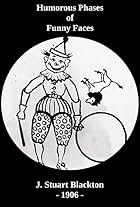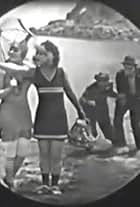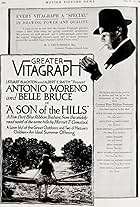Advanced search
- TITLES
- NAMES
- COLLABORATIONS
Search filters
Enter full date
to
or just enter yyyy, or yyyy-mm below
to
to
to
Exclude
Only includes titles with the selected topics
to
In minutes
to
1-50 of 3,277
- In honor bound, Stephen Fiske, Jr., son of a supposed millionaire, tells Doris Myhtle, his fiancée, that the death of his father has revealed that he has died penniless and left him a poor man. She is so disappointed she returns her engagement ring to him, which he throws into the fire. He is obliged to go to work as an ordinary laborer. She tells her Aunt Patience, with whom she lives, and the old lady confides the romance of her life to her. She was engaged to Stephen's father. She rejected him and it was the regret of her life, and almost broke her heart when he married another woman. One evening, Aunt Patience, after a day's shopping, entering her home, slips, injuring herself, and Stephen, returning from his day's work, finds her on the area step, and carries her into the house. He calls a doctor, who pronounces her injuries fatal. The old lady recognizes Stephen, of whom she is very fond, and who closely resembles his father. She expresses a hope that he and Doris will be wedded to each other, and again repeats the romance of her life. As she does so, visions of the happy retrospect appear before her and she passes away in thoughts of that past happiness, and a full realization of the joys that await her in the life beyond. Grieving at the loss of their good friend, Doris and Stephen, kneeling at her bedside, touch hands, and looking into each other's eyes, they ask each other if they will fulfill Aunt Patience's hope. The mutual fervor with which they silently embrace each other is their answer.
- A hungry mosquito spots and follows a man on his way home. The mosquito slips into the room where the man is sleeping, and gets ready for a meal. His first attempts startle the man and wake him up, but the mosquito is very persistent.
- The cartoonist, Winsor McCay, brings the Dinosaurs back to life in the figure of his latest creation, Gertie the Dinosaur.
- An account of the life of Jesus Christ according to the New Testament, told as a series of tableaus interspersed with Bible verses.
- A young woman discovers a seed that can make women act like men and men act like women. She decides to take one, then slips one to her maid and another to her fiancé. The fun begins.
- Peter Blood, a young Irish physician, treats a rebel soldier wounded in battle, and he is arrested, tried for treason and sent into slavery to Barbados. He and his friend Jeremy are bought by the vicious Col. Bishop, who purchases them for his niece Arabella. Blood rallies the other slaves to rebel against their slavery; they escape and take over a Spanish galleon. Blood and his crew become pirates and the scourge of the Caribbean. England, at war with France and losing, offers him a commission in the Royal Navy if he will fight for them. Blood, who has no love for the French but even less for the English, has to decide whether it's better for he and his men to fight with the English or against them.
- A reel of mirth-provoking stunts that will draw the pennies from the children, but which is of much interest to young and old alike. It opens with a crowd of children leaving school and marching through the streets to the "Humpty Dumpty Circus." We see them crowd into the tent and at the end of each act they vociferously applaud the performers These are the little wooden toys that are familiar to all, and which are made to perform all the usual acrobatic stunts of the circus performer in a remarkably realistic manner. Some of the scenes are really comical and it is hard to believe that the elephants and donkeys are not alive.
- A cartoonist draws faces and figures on a blackboard - and they come to life.
- On a dark and stormy night, a traveler takes a room at a spooky hotel in the forest. As soon as the proprietor leaves, the room comes alive with ghosts and poltergeists who torment the man as he tries to unpack, eat, and go to sleep.
- PART I. The incidents of this story are some of those preceding and lending up to the Civil War in 1861 and the Declaration of Emancipation. The central figure in the drama is Uncle Tom, a slave in the possession of the Shelbys of Kentucky. Tom is a peculiarly extraordinary character, possessing all the virtues and none of the bad qualities of his race, a possession brought about by a gradual realization, absorption and practice of Christian principles through a close study of the Bible. To the Shelbys he is an invaluable asset, because of his honesty and trustworthiness. Mr. Shelby, although owner of vast estates, has become greatly involved in debt, as is often the case with aristocracy. His notes have come into the hands of a slave trader named Haley, who presses Shelby for money long overdue. While visiting Shelby on one of his periodic "duns," he agrees to purchase "Uncle Tom" and Harry, a child of a quadroon, Eliza, Mrs. Shelby's maid. It is a hard bargain, but necessity, which is apt to drive to extremes, succumbs and the deal is made. Eliza overhears the transaction, and, loving her child with all her heart, decides to flee with him to the Ohio side of the river. She escapes from the house during the night, goes to "Uncle Tom's" cabin and tells him and his wife, "Aunt Chloe," all about her trouble, and also that Tom has been sold to the slave dealer, and advises him to get away while there is yet time. Tom, feeling it his bounden duty to live up to the tenets of his sale as well as his own conscience, refuses, but blesses Eliza and wishes her Godspeed. When Haley discovers the flight of Eliza he is frantic, and, calling into service some of Shelby's slaves and the ever-ready bloodhounds, he starts in pursuit of his prey. Eliza has made her way with her dear Harry clasped to her bosom to the banks of the Ohio River in a driving snowstorm, with the piercing cold winds carrying the baying of the bloodhounds to her ears as they follow mercilessly in her tracks. The ferryboats are not running, and the boatmen who usually ply their traffic across the river are afraid to encounter the fierce storm and the ice floes at the risk of their produce and their own lives. Spurred on by mother love and courage born of liberty and protection of the helpless, Eliza unhesitatingly jumps down the river's bank onto a large cake of floating ice, which rafts her down the stream, then from one piece of ice to another she leaps like a deer until she reaches the Ohio side of the river, where she is assisted up the bank and seeks shelter for herself and child. Haley and his negro aides are baffled in the capture of their quarry. Haley is furious, the negroes delighted, and while Haley goes to the tavern to appease his wrath the darkies show their pleasure in fits of laughter, and return to the Shelby place to report Eliza's escape. Haley, after a night of it in company with Marks, the lawyer, and Tom Rorer, a human bloodhound, goes back to take possession of "Uncle Tom," by the sale of whom he hopes to make up the loss of Harry. Uncle Tom, after a last farewell to his wife and little pickaninnies, and a hearty good-bye from young "Mars" George Shelby, who promises he will purchase "Tom" himself some day, gets into Haley's wagon, shackled hand and foot, with a sad heart but Christian resignation, bids farewell forever to his old Kentucky home. PART II. Haley, with Uncle Tom and his other slaves, boards the steamboat and starts down the Mississippi for Louisiana. On the boat going home from a visit to Vermont is Mr. Augustine St. Clare with his little daughter, Eva, a beautiful child of delicate temperament, and a maiden aunt named "Miss Ophelia." On the way down the river poor Tom makes himself helpful and cheerfully obliging to everybody, lending a hand with the freight and saying a kind and courteous word whenever spoken to. Whenever he can find time he reads in his laboring way his Bible, which is a source of great comfort to him. Eva is especially attracted to Tom. He has his pocket stored with odd toys of his own manufacture, which furnishes her great amusement during the long and tedious progress of the boat. One day Eva falls overboard. Uncle Tom with unhesitating courage jumps into the river and brings her safely back to the boat. This cements her attachment for Tom. She begs her father to buy him for her own. The father, always ready to satisfy her every wish, makes a deal with Haley, and Tom is purchased for Eva, who makes him her companion and attendant. "Miss Ophelia," although a northerner, is shocked at the readiness with which Eva associates and confides in Tom, but as she learns afterward it is not misplaced and well deserved. The St. Clares arrive at their home in New Orleans. Tom is initiated as a member of the household, and while officially the coachman he is personally the bodyguard of Eva and he is her confidant fides achates. We can see the sensitive nature and constitution of the child gradually succumb to the climatic changes and the rackings of the severe cough and cold which has settled upon her lungs. Her father decides to move the family and household to his country home where he hopes Eva will improve and get well. It is here we are introduced to "Topsy," a coal black little negress whom St. Clare buys for "Miss Ophelia" to call her own and bring up in the way she would have her go. From this time on to the close of the film "Topsy" is a noticeable and amusing person. For two years Uncle Tom's life with the St. Clares is an uninterrupted dream, excepting the thoughts of his separation from his dear old wife and his children. After two years little Eva's illness becomes so bad she appears to be undergoing a process of translation and looks more like a vision of immortality in the midst of mortal things. Often she talks with Uncle Tom about Heaven with an understanding that makes Tom think, and everybody else for that matter, that she is not long for this world. These suppositions are well founded, for it is not long before Eva is seen on her bed surrounded by her parents, Aunt Ophelia, Uncle Tom and the servants of the family. She bids each one good-bye, giving each some little keepsake, then peacefully passes away to join the other angels in Heaven. PART III. The sorrow following the death of little Eva has scarcely passed when the house of St. Clare is again thrown into mourning by the death of Mr. St. Clare, who was stabbed while trying to stop a quarrel between two men. Mr. St. Clare had promised Uncle Tom his freedom, in anticipation of which he is inspired with new hope and great ambition to work for the liberation of his wife and children, but all this is doomed by his master's untimely end, and all the servants of the St. Clare place are sold to speculators and other masters. Tom is sold to Legree, who is brutal in the extreme, and treats poor Tom with little less consideration than a dog. Legree has established as his mistress Cassie, a quadroon slave, whom he treats as badly as he dares, for she has a strong influence over him and despises him with a heartiness that she cannot hide. One day, working in the cotton field, Cassie meets Uncle Tom, and is impressed by his generosity and gentleness of spirit and his all-abiding faith in God. At the same time Legree bought Tom he bid on a young mulatto girl named Emmeline, whom he also introduced into his household to displace Cassie, whom he tries to relegate again to the cotton picking rank of slaves. Emmeline likes Cassie, abhors Legree, and keeps as far from him as possible. Tom is subjected to every sort of indignation and uncomplainingly does his duty. It is not until he is asked to flog a poor slave girl that he refuses to obey his master, and is himself unmercifully whipped by Legree and two of his slaves. Cassie finds life with Legree unbearable, and hates him with an indescribable intensity. She plans to accomplish escape for herself and Emmeline, and asks Uncle Tom to go with them, but he refuses to leave while others suffer for no more reason than himself. Cassie plays upon Legree's superstition and fear, for, in reality, he is an arrant coward, and she makes him believe there are ghosts in the garret of his house, and when she and Emmeline take flight and he pursues them with bloodhounds and slaves, the women retrace their steps, after passing through the swamp to throw the dogs off the trail, and return to the garret, where they remain for three days and make good their escape when favorable opportunity presents itself after Legree has given them up as gone. Legree, filled with rage, for want of better excuse accuses Uncle Tom of knowing something about Cassies escape and being party to it. Tom denies that he had any hand in it, and refuses to reveal his knowledge of it. Legree vents his spite and cussedness by administering a severe beating to Tom and felling him with a savage blow. Young Shelby, who promised Tom at the time his father sold him to Haley that he would repurchase him as soon as he could, now comes to Legree's place to buy him back. Too late! Poor Tom has gone to his eternal freedom to dwell with his Master, who makes no distinction in color, creed or class and prepareth a place for all those who love Him and keep His Commandments, and of whom Tom was a faithful disciple. - The Moving Picture World, August 6, 1910
- Cartoon figures announce, via comic strip balloons, that they will move - and move they do, in a wildly exaggerated style.
- Outside Cleopatra's palace a youth and maiden are observed. They are evidently very much in love with each other. While conversing, the gates open, Cleopatra and Mark Antony come forth, accompanied by soldiers, dancing girls. Etc. He bids farewell to Cleopatra and, accompanied by a bodyguard, starts on his journey. The youth takes no further notice of his sweetheart, but gazes fascinated at Cleopatra, who, after waving farewell to Antony, re-enters the palace. The youth continues to gaze after Cleopatra, pushes his affianced aside, falls to his knees and kisses the step where Cleopatra stood. He then goes into the grounds, underneath her bedchamber, writes on a scroll of his ardent love, wraps the paper around his arrow and shoots it through the window. Inside the chamber Cleopatra and her servants are startled, take the arrow and read the note. Looking outside, nobody can be seen. Shortly afterward Cleopatra goes outside to the bathing pool, poises on the brink, when, looking toward a clump of bushes, she spies the lovesick youth. He is brought out and Cleopatra imperiously demands what his presence means. He is not abashed, but kneels and tells of his love. Cleopatra orders her attendants away, takes the youth and leads him off. When alone he again reiterates his love. Cleopatra orders her servants to bring wine, fruit, perfumes, etc. Dancing girls appear, execute a few manoeuvres, then leave. Cleopatra then rises and dances before the youth. A servant enters, delivers a message to the mistress, then departs. Cleopatra hands a goblet to the young man, who drinks its contents, then falls dead. Cleopatra bows over his body a moment, then springs up and sits on the throne as Mark Antony comes down the steps. He salutes and embraces Cleopatra, observes the corpse and demands an explanation. Cleopatra carelessly replies: "Just another slave l was experimenting on with poison."
- A condensed silent film version of the Charles Dickens classic about the French Revolution and its subsequent Reign of Terror.
- A man decides to stage a fake robbery in front of his girlfriend's father (who doesn't like him), hoping it will make the father change his opinion. Unfortunately, real crooks wind up taking the money from the "robbery", and the boyfriend has to get it back.
- Bashful Willie Wiggins courts Jane Brown, the village belle, but after nearly wearing out the sofa cannot find the courage to pop the question. Jane finally resorts to the old ruse of jealousy. That night the village folks of Mudville are scandalized to see Jane in the arms of a stranger silhouetted against the window shade. The whole town rises up in protest, and Willie, backed by the minister, demands an explanation of Jane. She guiltily denies the impeachment and the crowd, calmed by the dominie, disperse, but Willie camps on the doorstep to catch his "rival." Jane during the night regrets the scandal her little trick caused and flings the dummy she used into the well. Willie sees this and is horrified, believing it is the body of his rival, whom Jane has murdered. Frantic with excitement, he arouses the whole village. The indignant mob rush to Jane's home in their nighties and drag her forth dramatically. The sheriff goes down the well, and of course Jane has a good laugh on them all when the dummy is hauled up. Willie now realizes the depth of Jane's love and pops the question right then and there.
- Mike Callahan has but one collar, and that soiled, to attend the annual outing of the Bricklayers' Union with, so he sends it to Wing Lee, the Chinaman's, to have it done up in a rush. The boy loses the very important half-ticket; consequently when Mike calls for his collar he is told with many gestures, No tickee, no washee. Mike gets mad and gives battle to the Chinks, but they are too many for him and he has to run for his life, pursued by the whole crowd of Chinamen. An exciting chase follows, and the police force are dragged from their various pursuits of fishing, sleeping and guiding schooners over the bar to join in the chase, and they finally succeed in corralling the pursuers and the pursued. All march back to the laundry, where Mike, escorted by the police, searches until he finds his collar, just in time to join the Local Union in the parade.
- Helene Marie, on the run from the Russian police in St. Petersburg, plots to kill the Czar.
- 19101h 40mNot Rated5.8 (151)Billed as the "Fight of the Century", reigning champion Jack Johnson takes on former champion James J. Jeffries in a gruelling 15-round beatdown.
- Jean Valjean, a good and decent man who has nevertheless been convicted of a crime, escapes incarceration and lives for years shadowed by the vindictive and merciless man of the law, Javert.
- The millionaire's child is kidnapped. Sherlock Holmes after many thrilling adventures and narrow escapes rescues the child.
- Due to the abuse Sandy Morley suffers at the hands of his stepmother, he leaves his home in the mountains of North Carolina. After wandering for a number of days, he falls exhausted in front of the home of Markham, a rich factory owner from the North. Sandy appeals to Markham, who offers to send the boy through college. After Sandy's graduation, he is sent to his old home to start building a new factory. Lansing, Markham's scapegrace nephew, becomes jealous of the position Sandy holds and in revenge steals Sandy's sweetheart Cynthia Starr away from him. After their marriage, however, a girl with whom Lansing had an affair while at college confronts Cynthia. A divorce is then granted and Cynthia returns to marry Sandy.
- Poor Bessie MacGregor is struck by the automobile of wealthy Mrs. Templeton Orrin and is taken home to live with her. But Bessie leaves when Mrs. Orrin's brother, J. Warburton Ashe, trifles with her love. Thief Tony Pantelli befriends her in the tenement where she finds a room, tries to obtain money for her care from Ashe, and, failing, steals a goblet that Ashe has brought home from England, thinking it may be the Holy Grail. The goblet, which gives off a glow and is reputed to have healing powers, is recovered, stolen again, again recovered and stolen, and finally lost in a river. Meanwhile, Ashe exonerates Tony in night court, realizes he really loves Bessie, now cured, and is reunited with her.
- Two feuding houses are united with the marriage and eventual death of their children.
- After the overthrowing of Duke Senior by his tyrannical brother, Senior's daughter Rosalind disguises herself as a man and sets out to find her banished father while also counseling her clumsy suitor Orlando in the art of wooing.
- When sawmill owner Helen Cole is kidnapped by bandits, it falls on lumberjack Dan Stevens to rescue her, but "Wirenail" Hedges is not willing to give up without a fight.




















